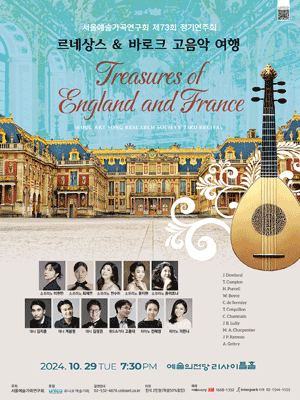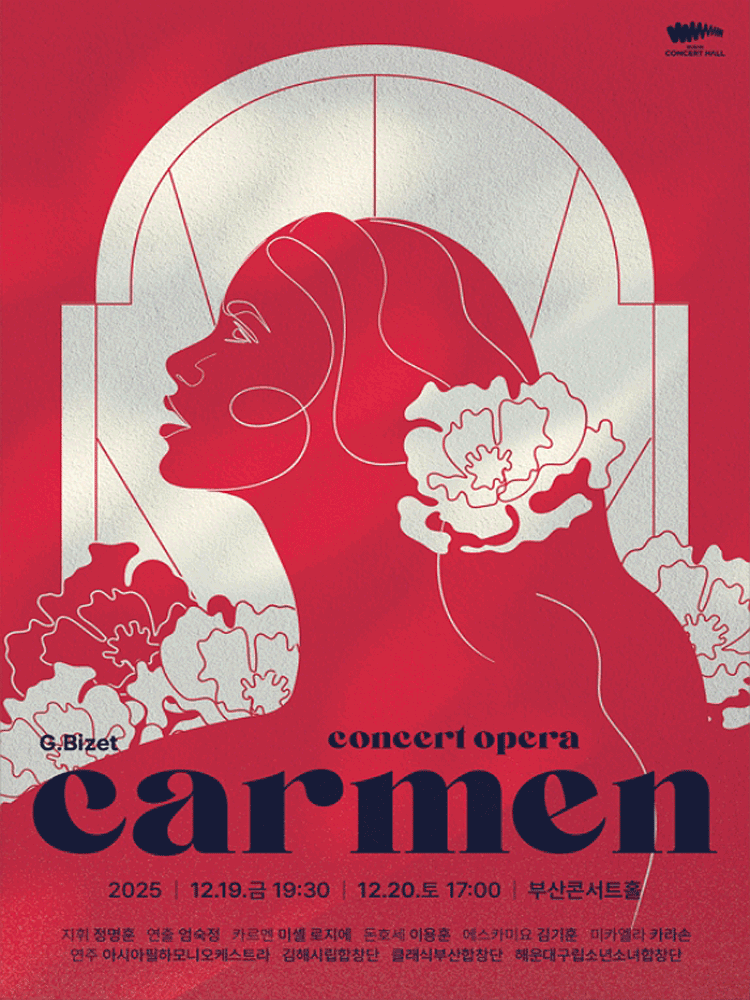영국 류트송과 퍼셀의 음악
Treasures of England and France : 르네상스 & 바로크 고음악 여행
영국 류트송과 퍼셀의 음악
Sop. 이현민, Lute 고종대
John Dowland (1563-1626)
Fine knacks for ladies
Flow my tears
Come again, sweet love doth now invite
Sop. 최재연, Lute 고종대
Thomas Campion (1567-1620)
Author of light
Tune thy music to thy heart
Come cheerful day
Sop 전수미, Pf. 이한나
Henry Purcell (1659-1695)
The blessed virgin’s expostulation
I attempt from love’s sickness to fly <from “Indian Queen”>
Ten. 김지훈, Pf. 이한나
William Boyce (1711-1779)
Softly Rise, O Southern Breeze <from the Serenta "Solomon">
Henry Purcell (1659-1695)
Come all ye songsters <from “The Fairy Queen”>
Yes, Xansi <from “The Fairy Queen”>
Intermission
프랑스 르네상스와 바로크 음악
Sop. 윤지현, with Guitar 고종대
Claude de Sermisy (c.1490-1562)
D’ou vient cela
Thomas Créquillon (c.1505-1557)
Cessez, mes yeulx de tant vous tormenter
Charles Chastelain (1672-1755)
Je ne desire que la mort
Ten. 계봉원, Pf. 전혜영
Jean-Baptiste Lully (1632~1687)
Que servent les faveurs
<from “Atys“, Acte III, Scène 1>
Bois épais
<from “Amadis“ Acte II, Scène 4>
Ô tranquille Sommeil, que vous êtes charmant!
<from “Persée“, Acte III>
Sop. 윤아르나, Pf. 전혜영
Marc-Antoine Charpentier (1643~1704)
Quel prix de mon amour
<from “Medée”, Acte III, Scène 3>
Jean-Philippe Rameau (1683~1764)
Formons.. Aux langueurs d'Apollon (Air de la Folie)
<from “Platée”, Acte II, Scène 5>
Ten. 김정권, Pf. 전혜영
André Grétry (1741~1813)
Si l'univers entier m'oublie
<from “Richard Coeur de Lion”, Acte II, Scène 2>
Ô Richard, ô mon roi (Air de Blondel)
<from “Richard Coeur de Lion”, Acte I, No.3>
프로그램 구성: 계봉원, 최재도
[2023년 이후로 네이버 연동 서비스는 종료 되었습니다.]

































 주간
: -위
주간
: -위 





 첫번째 평가를 해주세요.
첫번째 평가를 해주세요.







